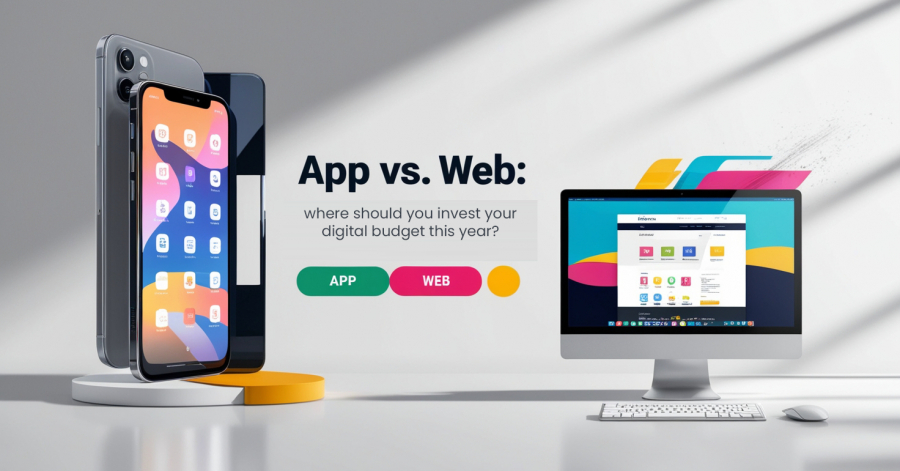The right decision depends on your business model, revenue strategy, and scalability needs. This article explores the financial and business implications of each option, helping managers determine when to raise funds for an app and when a web upgrade is the smarter investment.A Business Perspective on ROI and Growth Potential
For business decision-makers, every digital investment should be evaluated based on its potential to drive revenue, efficiency, customer acquisition, and long-term competitive advantage. When considering whether to fund a mobile app or web platform upgrade, the key question isn’t just about technology—it’s about business value.
If you’re thinking about raising funds to support either initiative, the decision should be based on market demand, revenue potential, scalability, and cost-efficiency. Let’s break down how businesses should evaluate these options from a financial and strategic perspective.
1. When Does an App Justify Fundraising and Investment?
A mobile app is not just a technology upgrade—it’s a business growth strategy. Raising funds to build an app makes sense when:
a) You Need a Scalable Digital Revenue Model
Apps can serve as a revenue-generating platform through:
•Subscription models (e.g., SaaS, premium memberships).
•In-app purchases (e.g., e-commerce, virtual goods, gaming).
•Advertising revenue (e.g., content platforms, marketplaces).
If your business model can monetize users effectively, an app provides direct access to customers and increases customer lifetime value (LTV).
Fundraising Justification: If investors see clear monetization potential, they may back your app development as a scalable revenue stream.
b) You Aim to Capture and Retain High-Value Customers
An app enhances customer engagement and retention, especially in industries like:
•E-commerce & retail: Personalized shopping experiences and push notifications drive repeat purchases.
•Finance & fintech: Apps provide seamless transactions and security features.
•Health & wellness: Subscription-based fitness, telehealth, and wellness services thrive with an app-first model.
Fundraising Justification: Investors look for businesses that can increase retention rates and user engagement, leading to predictable revenue growth.
c) You Want to Build an Ecosystem Around Your Business
A successful app can become a platform where users interact regularly—think Grab, Lazada, or Airbnb. If your business has the potential to offer multiple services within one digital ecosystem, an app can be a strategic asset.
Fundraising Justification: If your app could evolve into a super app or marketplace, investors will see it as a long-term business opportunity.
d) You Need to Differentiate from Competitors
If competitors are launching successful apps and shifting customer expectations, not having an app may result in a loss of market share. An app can provide a first-mover advantage in some industries, especially in sectors where digital transformation is still unfolding.
Fundraising Justification: Competitive pressure can drive urgency, making investors more willing to fund your app to capture early market share.
2. When Does Investing in Web Upgrades Make More Business Sense?
Not all businesses need an app to scale. Web platform upgrades are often a more strategic and cost-effective investment, especially when:
a) SEO and Lead Generation Are Your Priority
A well-optimized website can be a primary sales funnel. Unlike an app (which relies on downloads and user retention), a website allows businesses to:
• Rank on search engines (SEO), driving organic traffic.
• Capture and convert leads through landing pages.
• Reduce customer acquisition costs (CAC) compared to paid app installs.
Fundraising Justification: Investors may favor web upgrades if the goal is to drive inbound traffic and reduce marketing costs over time.
b) Your Business Relies on B2B or Enterprise Clients
If your business model focuses on B2B sales, partnerships, or SaaS, your audience is more likely to interact via web portals, dashboards, and cloud-based solutions. Apps may not be necessary if users primarily access services from a desktop or laptop.
Fundraising Justification: Web platforms often require less upfront investment than apps, and investors may prefer funding initiatives that show faster returns.
c) You Need Faster Time to Market
A website can be developed and deployed faster than a mobile app, making it the better short-term investment if you need immediate digital transformation.
Fundraising Justification: Web-based solutions can show quicker ROI, which is attractive to investors looking for shorter payback periods.
3. Hybrid Approach: Progressive Web Apps (PWA) as a Cost-Effective Alternative
For businesses that want app-like experiences but are constrained by budget, a Progressive Web App (PWA) is a viable middle ground. PWAs allow users to:
•Install a web-based app without an app store download.
•Access offline functionality and push notifications.
• Use mobile-friendly interfaces without the cost of native app development.
Fundraising Justification: Investors may support PWAs as a lower-risk, cost-effective solution before committing to a full app rollout.
4. Key Financial Considerations: App vs. Web Investment
|
Factor |
Mobile App |
Web Upgrades |
|---|---|---|
|
Development Cost |
High (native apps require separate iOS & Android builds) |
Lower (one platform for all users) |
|
Maintenance Cost |
Higher (updates, compliance, app store fees) |
Lower (easier updates) |
|
Customer Acquisition Cost (CAC) |
Higher (app downloads require marketing efforts) |
Lower (SEO and web traffic drive organic leads) |
|
Revenue Potential |
High (subscription models, in-app purchases) |
Moderate (mostly lead generation, SaaS models) |
|
Time to Market |
Longer (3-6 months for MVP) |
Shorter (weeks to months) |
|
Investor Interest |
High for scalable business models |
Moderate, but favored for B2B & SaaS
|
5. Final Decision: Where Should You Raise Funds?
Raise Funds for an App If:
✅ Your business has a scalable mobile revenue model (subscriptions, in-app purchases).
✅ You need high engagement, retention, and customer stickiness.
✅ Your industry is shifting towards mobile-first experiences.
✅ You have a clear competitive advantage by offering an app.
Raise Funds for Web Upgrades If
✅ Your business thrives on SEO, lead generation, and B2B interactions.
✅ You need a cost-effective, fast-to-market digital solution.
✅ Your audience doesn’t require mobile-specific functionality.
✅ You want to reduce customer acquisition costs while scaling.
Hybrid Strategy: If you’re unsure, start with a PWA or web-first approach and validate demand before committing to full mobile app development.
Conclusion: Think Business First, Technology Second
The decision to invest in an app or web upgrade is ultimately a business decision, not just a technical one. If an app aligns with your revenue model and engagement strategy, raising funds for it makes sense. However, if your primary goal is acquisition, discoverability, and cost-effectiveness, then web investments will yield better ROI.
Before making a final call, conduct market research, assess customer needs, and validate monetization potential. Need expert guidance? Contact Oasis Web Asia to craft a digital investment strategy tailored to your business goals.





